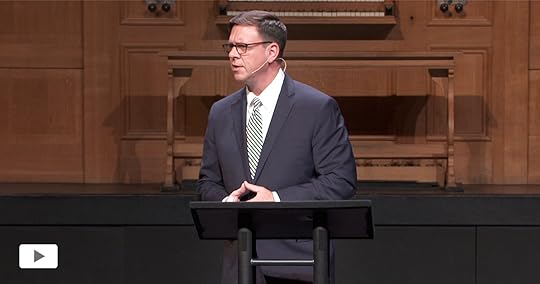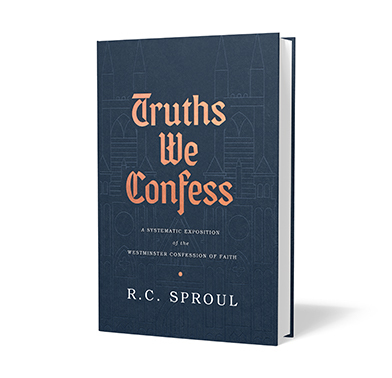R.C. Sproul's Blog, page 110
November 18, 2019
Save on Children’s Books: This Week Only

Whether you need a new story to read to your children or you’re searching for gifts to give the whole family, share timeless truths with children’s books by R.C. Sproul and other gifted authors.
For one week only, you can save up to 50% on beloved stories like The Lightlings, The Prince’s Poison Cup, Sammy and His Shepherd, and more. Select titles are also available as audiobook CDs and animatic DVDs.
These delightfully illustrated children’s books are purposefully created to make deep biblical truths clear and understandable to students of all ages. This offer ends on November 25, so don’t delay. View our sale collection today.


What Does the Church Most Need Today?

What does the church most need today? In answering this important but rather general question, Psalm 81 is uniquely important and helpful. This psalm obviously contains beautiful promises and clear directions to help the people of God. But careful study of this psalm will deepen our appreciation of it, increase its value for us, and show us how distinctive it is for helping the church.
As we study psalms, we soon learn that the central verse of a psalm is often significant as a key to its interpretation. The central line of Psalm 81 is the heart of that psalm, as the plaintive cry of God is heard: "O Israel, if you would but listen to me!" (v. 8b). The center of Psalm 81—indeed the whole psalm—is a reflection on the Shema.
The centrality of this line and its importance are underscored when we recognize that Psalm 81 is the central psalm of Book 3 of the Psalter. Book 3 (Psalms 73–89) principally concerns the crisis in Israel caused by the destruction of the temple (Ps. 74) and the apparent failure of God's promises that David's sons would forever sit on his throne (Ps. 89). Something of the cause and character of this crisis is contained in this central line of the central psalm.
Since Book 3 is the central book of the five books of the Psalter, Psalm 81:8b actually is the central line of the whole book of Psalms. It stands at the very heart of Israel's songbook. It calls Israel to deep reflection on her relationship to her God.
This psalm also appears to be central to Israel's liturgical calendar. The praise at new moon and full moon can refer only to the seventh month of the year, the Feast of Trumpets (Lev. 23:24; Num. 10:10) and the Feast of Tabernacles (Lev. 23:26–32). Between these two feasts occurred the Day of Atonement (Lev. 23:27). As God called Israel to celebrate His great provisions as Creator and Deliverer, so He called His people to hear Him.
As the Shema was crucial to the Torah, so it is central to the Psalter and to the Christian life. God's people must hear His Word, particularly to reject false gods (v. 9) and to walk in His ways (v. 13). They must not follow their own wisdom (v. 12). How sad to contemplate that God might give us what we think is good for us.
The Lord reminds His people that in history He has been the Deliverer and now promises that when we open our mouths in prayer, He will hear us and meet our needs (v. 10). He is the God who preserves and provides for the needs of His own.
The failure of Israel to hear the Word of God was rectified by God's own Son. Jesus always heard and honored God's Word. His Father delighted in Him for that reason: "This is my beloved Son, with whom I am well pleased" (Matt. 17:5). Jesus perfectly listened and followed so that His people would have a complete and perfect salvation. The Father continues to call His people to listen, now directing them to the words of His Son: "listen to him" (Matt. 17:5). The salvation and health of the church depend on it continuing to listen to God's Word.
Psalm 81 seems to reflect the time of exile, when God punished Israel with the loss of the temple, its king, and the land of promise. It also reminds us of an earlier time, when Israel doubted God and grumbled about Him (v. 7). At Meribah (Ex. 17), Israel tested the Lord, doubting that He was with His people, so the Lord tested Israel and found her wanting. Similarly, we can look at the history of the church and see many times and ways in which the church failed to listen to the Word of the Lord.
The time of the Reformation, of course, was one of the greatest times in which the church returned to the Word of God. The Reformation of the church occurred because Christians began again to study the Bible carefully. The Reformers studied Greek and Hebrew, provided the church with new translations of the Bible, used the new technology of the printing press to print Bibles, and prepared some of the finest commentaries and theologies in the history of the church.
Again in our time, the church must be called to listen to the Word of God. The churches of America too often seem interested in following other voices than the voice of God. For decades, some churches have taught that the Bible is not fully and truly the Word of God. Other churches formally recognize the Bible, but seem to have lost confidence that preaching and teaching the Bible is what will convert unbelievers and build the church. Many Christians today seem to practically ignore the Bible, and as a result, they are as worldly as their unbelieving neighbors.
God says to us today, as He said to Israel of old and says to every generation of His people: "O Israel, if you would but listen to me!" Let us pray that the Holy Spirit will open ears in our churches and throughout our land. And let us listen carefully and believingly. Such listening is what the church most needs today.
This post was originally published in Tabletalk magazine. Learn more about the Psalms in Dr. Godfrey's book and teaching series titled Learning to Love the Psalms.


November 16, 2019
Southern Ontario Conference Media Now Available

You can now stream all of the messages from last week’s Southern Ontario Conference for free on Ligonier.org, the Ligonier app, and YouTube.
True Truth by Steven Lawson
The Search for Truth by Burk Parsons
The True Messiah by Tim Challies
The Rejection of Truth by Albert Mohler
The Goal of Truth by W. Robert Godfrey
Questions & Answers with Challies, Godfrey, Lawson, and Mohler
Panel Discussion: Speaking the Truth in Love with Tim Challies, W. Robert Godfrey, Daniel Henderson, Steven Lawson, Albert Mohler, and Robert VanDoodewaard
JOIN US FOR UPCOMING EVENTS


The Pastoral Heart of John Calvin

In this brief clip from his teaching series A Survey of Church History, W. Robert Godfrey describes John Calvin's pastoral heart. Watch this entire message for free.
Transcript
Calvin is an interesting historical figure just as there's controversy about Luther who was he, how do we understand his psychology’s, language, some of the problems with Luther. The problem with Calvin is in a sense that he is hardly viewed as human. There's a little book written a number of decades ago now called “the Humanity of John Calvin.” Sort of as if it was in doubt that Calvin has almost been treated sometimes like you know, - a great disembodied brain in Geneva just sitting there thinking and turning out work. And if we think about him beyond just being a brain, then many see him just as sort of gloomy, oppressive you know the definition of a was it of the Calvinist or of Puritan, it doesn't really matter.
But a Puritan is one who fears that somewhere someone is having a good time. And that isn’t fair to Puritanism and it certainly isn’t fair to John Calvin. But it is sort of the general impression that Calvin has left in the popular mind of our day. And I think it is really worthy investment to try to get back behind that to see the real Calvin. That’s why I wrote my little book on Calvin, “Calvin: Pilgrim and Pastor” because I think the most important thing about Calvin was first of all that he was a pilgrim following Christ to find the truth as it was in Christ. And secondly, that he was a pastor. I think for Calvin, all of his theological work was to help him and others do pastoral work. He wasn't -- you know we have a lot of people today who are pastors who really want to be theologians and they just need to be pastors to pay the bills. That is tragic for the life of the church. We need pastors who want to be pastors, who want to preach and who want to be out with the people to help them. Calvin was a pastor like that. And he did his theological work and his biblical studies to help him and others in the pastoral work.
And in that sense we see the heart of Calvin. He wasn’t just a brain. He thought getting things right in your brain was important but it was so that Christian lives could be properly balanced in the Biblical way and that was his passion.


November 15, 2019
Can I Know That I Am Saved?

Our assurance rests not on the strength of our faith, but on the strength of the Savior in whom we have faith. From one of our Ask Ligonier events, Burk Parsons counsels Christians who may be uncertain about their salvation.
To ask Ligonier a biblical or theological question, just visit Ask.Ligonier.org.or message us on Facebook or Twitter.
Read the Transcript


4 Principles for the Exercise of Christian Liberty

It was years ago now, but I still remember the discussion. I was making my way out of our church building some time after the morning service had ended, and was surprised to find a small group of people still engaged in vigorous conversation. One of them turned and said to me, "Can Christians eat black pudding?"
To the uninitiated in the mysteries of Scottish haute cuisine, it should perhaps be said that black pudding is not haggis! It is a sausage made of blood and suet, sometimes with flour or meal.
It seems a trivial question. Why the vigorous debate? Because, of course, of the Old Testament's regulations about eating blood (Lev. 17:10ff).
Although (as far as I am aware) no theological dictionary contains an entry under B for "The Black Pudding Controversy," this unusual discussion raised some most basic hermeneutical and theological issues:
How is the Old Testament related to the New?
How is the Law of Moses related to the gospel of Jesus Christ?
How should a Christian exercise freedom in Christ?
The Council of Jerusalem, described in Acts 15, sought to answer such practical questions faced by the early Christians as they wrestled with how to enjoy freedom from the Mosaic administration without becoming stumbling blocks to Jewish people.
These were questions to which Paul in particular gave a great deal of thought. He was, after all, one of those appointed by the Jerusalem Council to circulate and explain the letter that summarized the decisions of the apostles and elders (Acts 15:22ff; 16:4). Faced with similar issues in the church at Rome, he provided them with a series of principles that apply equally well to twenty-first-century Christians. His teaching in Romans 14:1–15:13 contains healthy (and very necessary) guidelines for the exercise of Christian liberty. Here are four of them:
Principle 1: Christian liberty must never be flaunted. "Whatever you believe about these things keep between yourself and God" (Rom. 14:22, NIV).
We are free in Christ from the Mosaic dietary laws; Christ has pronounced all food clean (Mark 7:18-19). We may eat black pudding after all!
But you do not need to exercise your liberty in order to enjoy it. Indeed, Paul elsewhere asks some very penetrating questions of those who insist on exercising their liberty whatever the circumstances: Does this really build up others? Is this really liberating you—or has it actually begun to enslave you (Rom. 14:19; 1 Cor. 6:12)?
The subtle truth is that the Christian who has to exercise his or her liberty is in bondage to the very thing he or she insists on doing. Says Paul, if the kingdom consists for you in food, drink, and the like, you have missed the point of the gospel and the freedom of the Spirit (Rom. 14:17).
Principle 2: Christian liberty does not mean that you welcome fellow Christians only when you have sorted out their views on X or Y (or with a view to doing that).
God has welcomed them in Christ, as they are; so should we (Rom. 14:1, 3). True, the Lord will not leave them as they are. But He does not make their pattern of conduct the basis of His welcome. Neither should we.
We have many responsibilities for our fellow Christians, but being their judge is not one of them. Christ alone is that (Rom. 14:4, 10-13). How sad it is to hear (as we do far too often) the name of another Christian mentioned in conversation, only for someone to pounce immediately on him or her in criticism. That is not so much a mark of discernment as it is the evidence of a judgmental spirit.
What if the measure we use to judge others becomes the measure used to judge us (Rom. 14:10-12; Matt. 7:2)?
Principle 3: Christian liberty ought never to be used in such a way that you become a stumbling block to another Christian (Rom. 14:13).
When Paul states this principle, it is not a spur-of-the-moment reaction, but a settled principle he has thought out and to which he has very deliberately committed himself (see 1 Cor. 8:13). When that commitment is made, it eventually becomes so much a part of our thinking that it directs our behavior instinctively. We are given liberty in Christ in order to be the servants of others, not in order to indulge our own preferences.
Principle 4: Christian liberty requires grasping the principle that will produce this true biblical balance: "We ... ought ... not to please ourselves.... For even Christ did not please himself " (Rom. 15:1-3).
There is something devastatingly simple about this. It reduces the issue to the basic questions of love for the Lord Jesus Christ and a desire to imitate Him since His Spirit indwells us to make us more like Him.
True Christian liberty, unlike the various "freedom" or "liberation" movements of the secular world, is not a matter of demanding the "rights" we have. Dare one say that the American Founding Fathers, for all their wisdom, may have inadvertently triggered off a distortion of Christianity by speaking about our "rights" to life, liberty, and the pursuit of happiness? The Christian realizes that before God he or she possesses no "rights" by nature. In our sinfulness, we have forfeited all of our "rights."
Only when we recognize that we do not deserve our "rights" can we properly exercise them as privileges. Sensitivity to others in the church, especially weaker others, depends on this sense of our own unworthiness. If we assume that we have liberties to be exercised at all costs, we become potentially lethal weapons in a fellowship, all too capable of destroying someone for whom Christ has died (Rom. 14:15, 20).
That does not mean that I must become the slave of another's conscience. John Calvin puts the point well when he says that we restrain the exercise of our freedom for the sake of weak believers, but not when we are faced with Pharisees who demand that we conform to what is unscriptural. Where the gospel is at stake, liberty needs to be exercised; where the stability of a weak Christian is at stake, we need to restrain it.
This is all part and parcel of "living between the times." Already, in Christ, we are free, but we do not yet live in a world that can cope with our freedom. One day we will enjoy "the glorious liberty of the children of God" (Rom. 8:21). Then may we eat black pudding whenever and wherever we want to! But not yet.
For now, as Martin Luther wrote, "A Christian man is the most free lord of all, and subject to none; a Christian man is the most dutiful servant of all, and subject to every one."
As it was with the Master, so it is with the servant.
This excerpt is taken from In Christ Alone by Sinclair Ferguson.


November 14, 2019
$5 Friday: God's Holiness, Scripture, & Theology

It’s time for our weekly $5 Friday sale. This week’s resources include such topics as God's Holiness, scripture, theology, Christian living, William Tyndale, providence, and more.
Sale runs through 12:01 a.m. — 11:59 p.m. Friday ET.
View today’s $5 Friday sale items.


Ungratefulness as the Root of Sin
Here’s an excerpt from Ungratefulness as the Root of Sin, William B. Barcley's contribution to the November issue of Tabletalk:
When my niece was two and a half, my sister and brother-in-law took her to visit friends. When they arrived, the six-year-old daughter of those friends took my niece into another room to play with her while the adults talked together. After about twenty minutes, the six-year-old came into the room exasperated. She had been playing a game with my niece that required her to hand my niece dozens of game pieces. The little girl complained, “Every time I hand her a piece, she says ‘thank you’ and waits for me to say ‘you’re welcome.’ ” This had been the constant “dialogue” for twenty minutes, and the older girl had gotten frustrated with it.
Teaching our children to give thanks and to have a thankful spirit is an important part of Christian parenting. The reason is that our heavenly Father demands that His children overflow with thanksgiving. Thankfulness is central to being a follower of Jesus Christ. Ungratefulness, on the other hand, is a sin and the root of other sins.
God created man—then re-created His people—to worship Him. In the classic work The Rare Jewel of Christian Contentment, Jeremiah Burroughs writes, “Worship is not only doing what pleases God, but also being pleased with what God does.” Worship includes taking delight in and giving thanks for all that God brings into our lives—in all circumstances. The thankful heart is the worshipful heart. The thankless heart is incapable of worshiping God.
Continue reading Ungratefulness as the Root of Sin, or begin receiving Tabletalk magazine by signing up for a free 3-month trial.
For a limited time, the new TabletalkMagazine.com allows everyone to browse and read the growing library of back issues, including this month’s issue.


November 13, 2019
The Heart of the Law
In this brief clip from his teaching series Discovering Deuteronomy, W. Robert Godfrey examines how the Law is for the good of God's people.
Transcript
And Moses says, "Now Israel, what does the LORD your God require of you?" It's a great question, isn't it, posed in other places in the Scriptures. But what is said here in answer to this? What does the LORD require of you? What does His law insist on? "But to fear the LORD your God, to walk in all his ways, to love him, to serve the LORD your God with all your heart and with all your soul, and to keep the commandments and statutes of the LORD, which I am commanding you today, for your good." Here's the very essence of it. God has entered into covenant with His people for their good. And what does He want from them? He wants them to fear Him and obey Him and love Him and serve Him. It almost sounds like a wedding ceremony, doesn't it? Here's a pledge that God has given to His people and that He's asking of them. This is the heart of the Law. This is the core of the Law, and it's so beautifully expressed here. It's so powerfully stated about the relationship that God would have with His people.


November 12, 2019
Will Your Beliefs Stand the Test of Time?

You and I are bound to a sacred calling: to profess and proclaim the unvarnished truth of God in a world that is increasingly hostile to such a message.
We live in a culture that hates objective truth, especially when it stands in direct opposition to the spirit of our age and the secularistic way in which people think and live. Many people today would rather hear blatant falsehood than hear what is true because false ideas affirm and applaud sinful lifestyles and ways of thinking—false ideas about God and man, identity and ethics, and right and wrong.
If we do not stand our ground for the truth, then we capitulate to a corrupted culture that is clamoring for us to be silent—and that is precisely what is happening everywhere. Sadly, many professing Christians, even many pastors and churches, have begun to open their minds to distortions and close their mouths from proclaiming the truth of God’s Word. Right thinking is scorned when people are addicted to falsehood. Truth hits people right between the eyes and cuts to the heart, calling them to repent and believe.
We are Christians because, by the grace of God, we believe and trust in the One who is the way, the truth, and the life. We have been set free by the Spirit of truth and are sanctified by His Word so that we might praise the God of truth and proclaim His Word to our neighbors. However, if we do not guard the truth for the next generation, people might not know the truth because they might not know where to find it. Many churches have not earnestly contended for the faith once delivered to the saints and have not guarded the faith for the next generation.
Throughout history, the primary way the church has guarded the faith is through our historic creeds and confessions. That is precisely how we do it today: looking to the trusted confessions of our faithful forefathers in order that our children and grandchildren might not be led astray by every wind of doctrine and the cunning craftiness of false teachers.
The truth must be guarded so that the coming generations might hear it, know it, believe it, and proclaim it, so that the one true God may be known and glorified. We must not give mere lip-service to our creeds and confessions. On the contrary, we must heartily believe and confess the truths contained within them. True Christianity is confessional Christianity.
By God’s grace, we at Ligonier Ministries strive to guard the truth of God for the coming generations by standing on the historic creeds and confessions of the church. These concise summaries of biblical revelation are like maps that were written by those who have gone before us, pointing us in the right direction and guiding us along the way so that we might not stumble into theological pitfalls. Ligonier is committed to helping the church fulfill the Great Commission of Jesus Christ without theological compromise. Through Tabletalk magazine, Reformation Trust books, national and international events, daily Renewing Your Mind broadcasts, podcasts, and many other growing outreaches, we are constantly working to serve our Lord and His church by proclaiming His truth to the ends of the earth.
When you support Ligonier this month with a gift of any amount, we will send you Truths We Confess, Dr. Sproul’s new, single-volume commentary on the Westminster Confession of Faith. This thoroughly revised edition of Dr. Sproul’s work was one of the last projects he worked on before going home to be with the Lord. I trust that it will help you better understand and guard the truth of Scripture.
By supporting Ligonier, you are working with us as we strive together to proclaim and guard the truth for coming generations—until our Lord returns—all by His grace and all for His glory alone.
P.S. Dr. Sproul valued the Westminster Confession of Faith as a comprehensive statement of biblical Christianity. This month, you can receive his line-by-line exposition of the confession, Truths We Confess, as our thanks for your donation of any amount. Thank you for striving with us to guard and proclaim the truth of God’s Word.


R.C. Sproul's Blog
- R.C. Sproul's profile
- 1932 followers




